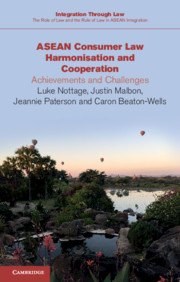Book contents
- ASEAN Consumer Law Harmonisation and Cooperation
- Integration Through Law
- ASEAN Consumer Law Harmonisation and Cooperation
- Copyright page
- Contents
- General editors’ preface
- Figures
- Tables
- Contributors
- Acknowledgements
- Abbreviations
- Chapter 1 Introduction: Backdrop and Overarching Perspectives
- Chapter 2 Theoretical Perspectives on ASEAN and Consumer Law Developments
- Chapter 3 Product Safety Law: Fragmented Regulation and Emergent Product Liability Regimes
- Chapter 4 Regulating Consumer Contracts in ASEAN: Variation and Change
- Chapter 5 Consumer Financial Services: What Role for ASEAN?
- Chapter 6 Professional Health Services: ASEAN’s Trade Liberalisation Agenda
- Chapter 7 Integration with Competition Policies, Laws and Institutions: Opportunities for ASEAN Consumer Protection
- Chapter 8 Key Reflections and Future Directions
- Index
Chapter 5 - Consumer Financial Services: What Role for ASEAN?
Published online by Cambridge University Press: 24 August 2019
- ASEAN Consumer Law Harmonisation and Cooperation
- Integration Through Law
- ASEAN Consumer Law Harmonisation and Cooperation
- Copyright page
- Contents
- General editors’ preface
- Figures
- Tables
- Contributors
- Acknowledgements
- Abbreviations
- Chapter 1 Introduction: Backdrop and Overarching Perspectives
- Chapter 2 Theoretical Perspectives on ASEAN and Consumer Law Developments
- Chapter 3 Product Safety Law: Fragmented Regulation and Emergent Product Liability Regimes
- Chapter 4 Regulating Consumer Contracts in ASEAN: Variation and Change
- Chapter 5 Consumer Financial Services: What Role for ASEAN?
- Chapter 6 Professional Health Services: ASEAN’s Trade Liberalisation Agenda
- Chapter 7 Integration with Competition Policies, Laws and Institutions: Opportunities for ASEAN Consumer Protection
- Chapter 8 Key Reflections and Future Directions
- Index
Summary
This chapter takes a regionalist perspective in exploring ways ASEAN can protect and advance consumer interests regarding consumer finance. Presently, ASEAN, as an organisation, is paying relatively little attention to the opportunities and challenges presented. The chapter explores some of the ‘traditional’ issues arising at the domestic level, including lenders: charging excessive interest rates; misleading and deceiving consumers; and harassing them or engaging in illegal activity when recovering loan repayments. Emerging issues include the rise of fintech. It offers new opportunities for financial inclusion, but also presents new challenges due to the rise of non-financial institution lenders, including those operating online platforms. Lack of proper regulation of these lenders risks regional financial instability and the exploitation of low-income consumers. Given the pace and complexity of change and the increasingly borderless nature of fintech, a regional approach could best assist with developing appropriate responses. The chapter proposes that enhanced shared knowledge and more effective networking amongst key players within ASEAN would advantage the region as a whole.
Keywords
- Type
- Chapter
- Information
- ASEAN Consumer Law Harmonisation and CooperationAchievements and Challenges, pp. 261 - 318Publisher: Cambridge University PressPrint publication year: 2019



